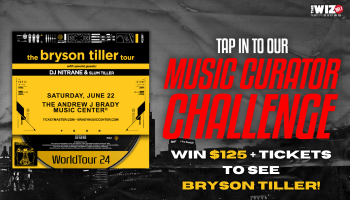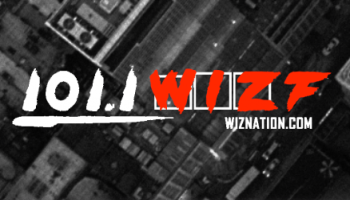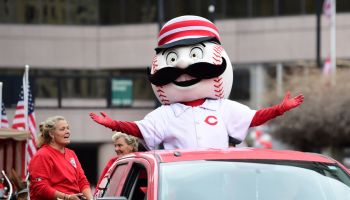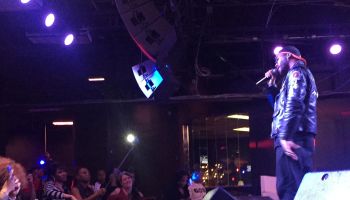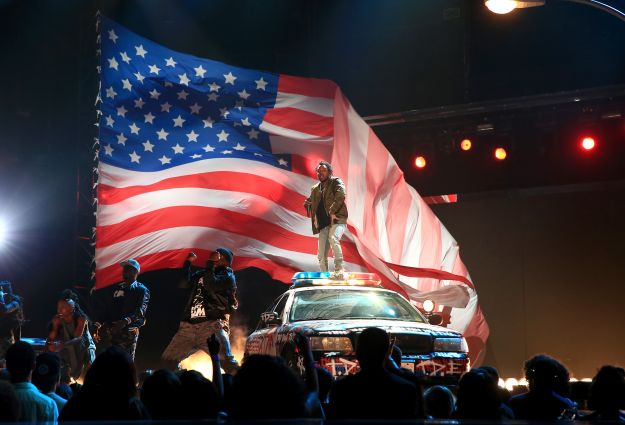
Source: Christopher Polk / Getty
Future’s “March Madness” is not exactly a Civil Rights song.
It’s not an uplifting song. It’s not a socially-aware polemic against the system. What it is is another standout example of what Future does best: catchy, drug-riddled bangers soaked in codeine and autotune in equal measure. But, somehow “March Madness” manages to be the exemplar of just how far the reach of the #BlackLivesMatter movement has grown. A single out-of-place line that doesn’t even seem in keeping with the song, “All these cops shooting niggas/tragic,” highlights the changing nature of hip hop over the past year.
A full year has passed since officer Darren Wilson killed Michael Brown on Canfield Drive in Ferguson, Missouri. While the #BlackLivesMatter movement, both as a collective of activist organizers and a social media-driven ethos was born in 2013 after the death of Trayvon Martin, it has become a force in the year since Michael Brown’s death. Many activists within the movement have become powerful and effective leaders, and early reports indicate that it it working in many ways, as public opinion has bent to the idea that systemic oppression does impact our lives.
#BlackLivesMatter has also impacted many other facets of our lives in the past year, including music. Hip-hop as a Black music form has always responded to the energies of the youth in the Black community, and many writers (including myself) noted at the end of 2015 that hip-hop had already begun responding to the #BlackLivesMatter movement. A full year after Michael Brown’s death and it has been transformed.
The most obvious example of the post-Ferguson influence on hip-hop is Kendrick Lamar’s To Pimp a Butterfly. The album’s most successful single “Alright” has taken on a role somewhat similar to that of negro spirituals in the Civil Rights Movement, and has been both a rallying cry and a mantra for emotional health among activists. The song’s video is a long form treatment of Lamar’s personal evolution. A year ago, Lamar was under fire for remarks made in an interview in which he turned to respectability as a response to police violence. Lead single “Blacker the Berry,” while an evolution and complication of this view, still received some backlash for similar lyrics.
However, the video for “Alright” shows an increasingly nuanced view of the issues of police brutality, activism, and history in the rest of To Pimp a Butterfly have highlighted Kendrick Lamar’s evolution and shown how deeply #BlackLivesMatter has been in conversation with him. As the movement matured, so did Kendrick Lamar, undoubtedly pressured by the movement’s loosely binding philosophies.
Lamar’s Hiiipower running mate J. Cole, has also been an influencer in the changing voice in contemporary hip hop. His live performance of “Be Free” in winter 2014 was used as a protest song nationwide and he has regularly included it in shows and concerts since. Cole is socially active in social media and on the ground, even making an appearance at protests for Eric Garner’s death in New York last December. Cole and Lamar were the earlier responders to calls from artists like ?uestlove for protest music to be revived.
But they weren’t the last. John Legend and Common’s song “Glory” on the soundtrack for Ava Duvernay’s film Selma won an Oscar and enjoyed wide success, culminating in a riveting performance at the prestigious award show. The Game and a full entourage of rappers released “Don’t Shoot,” a well-intentioned if ham-handed response to the Michael Brown shooting. Chance the Rapper has become an increasingly active voice in Black activism, and his events and musical projects have fostered Black community development and police violence.
Whether inspired or pushed by these artists, others like Future have responded with song lines and concepts referencing police violence. Wale joined protesters and spoke on Freddie Gray’s death. Lupe Fiasco’s best-reviewed album in years featured numerous references to policy brutality and the animus of #BlackLivesMatter. Drake’s most questionable line in his Meek Mill diss, “Charged Up” involves an appeal to police violence in admonishing Meek Mill’s action. Vince Staples, The Internet, Most recently, the wave has come full circle as Dr. Dre, one of the originators behind “Fuck tha Police” weighed in on his new Compton album: “Just a young black man from Compton wondering who could save us, and could barely read the sentences the justice system gave us.”
These lyrics and songs are just a sampling of where the music has moved in the year post-Ferguson. As the world is changing, so the music is also changing. This is more true of hip-hop than any other form, and no other genre has responded to the unique challenges and struggles of the Black youth as hip-hop. It was born in the struggle of those youth to be heard and it finds purpose again in the struggle to make their lives matter.
How #BlackLivesMatter Helped Evolve A New Generation Of Hip-Hop Protest Music was originally published on theurbandaily.com








